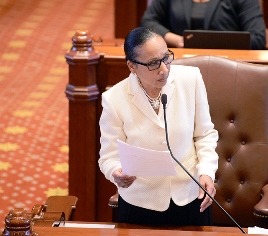- Published: Tuesday, February 10, 2015 02:40 PM
Last November, two-thirds of Illinois' voters agreed that if you work full-time, you and your family should not live in poverty. We in the Senate heard the message loud and clear, and in December, we responded, passing the minimum wage increase I co-sponsored. Unfortunately, the House declined to vote on the measure last year, and it died. We have reintroduced the minimum wage increase in the new legislative session, and last Thursday, the Senate reaffirmed our commitment to giving relief to the working poor who have seen costs rise as their pay stagnates. Senate Bill 11 would raise the minimum wage from $8.25 now to $9 starting this July, $10 by 2017 and $11 by 2019. In contrast to the governor's call for a $10 minimum wage by 2022, our legislation will make a real, tangible impact on the lives of working families struggling to escape poverty.
The political realities are different today than they were in December 2014, and the rhetoric has been heated and divisive, but the needs of the working people of Illinois remain the same. During the debate on the Senate floor, I reminded my colleagues that the needs of the working poor and the wishes of the voters we represent ought to guide our consciences and our votes.



 SPRINGFIELD — Immediately following today's State of the State address, State Senators Jacqueline Y. Collins (D-Chicago 16th) and Iris Y. Martinez (D-Chicago 20th) stood with a group of their House and Senate colleagues to highlight the urgent need for youth employment programs stripped of state funding last week. The legislators, members of the House and Senate Black and Latino Caucuses, challenged the governor to square his actions with his rhetoric.
SPRINGFIELD — Immediately following today's State of the State address, State Senators Jacqueline Y. Collins (D-Chicago 16th) and Iris Y. Martinez (D-Chicago 20th) stood with a group of their House and Senate colleagues to highlight the urgent need for youth employment programs stripped of state funding last week. The legislators, members of the House and Senate Black and Latino Caucuses, challenged the governor to square his actions with his rhetoric. One hundred and fifty years ago this week, members of the 24th Illinois General Assembly made Illinois the first state to ratify the Thirteenth Amendment, which abolished slavery in the United States. Today, I stood - the great-granddaughter of a slave and a member of the 99th General Assembly - to recognize our predecessors' courage and the significance of the Thirteenth Amendment in driving the freedom train farther down history's long track. Following a moving ceremony commemorating the ratification vote, the Senate adopted a
One hundred and fifty years ago this week, members of the 24th Illinois General Assembly made Illinois the first state to ratify the Thirteenth Amendment, which abolished slavery in the United States. Today, I stood - the great-granddaughter of a slave and a member of the 99th General Assembly - to recognize our predecessors' courage and the significance of the Thirteenth Amendment in driving the freedom train farther down history's long track. Following a moving ceremony commemorating the ratification vote, the Senate adopted a 

